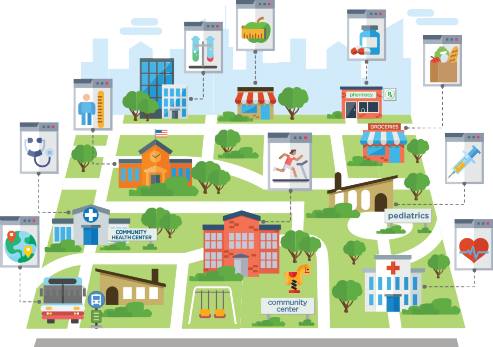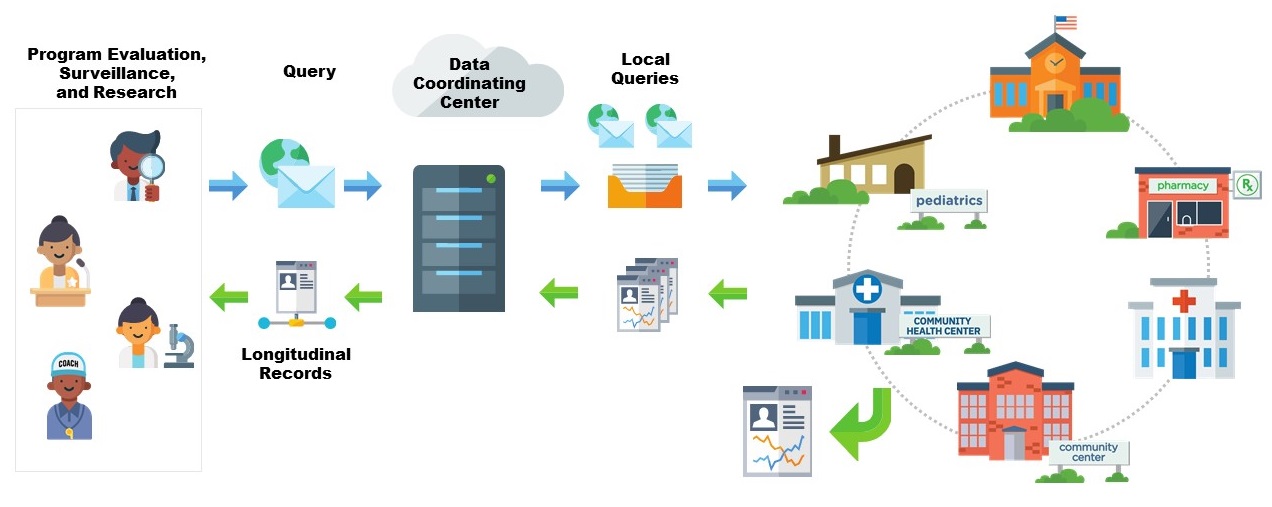
Clinical and Community Data Initiative
CDC’s Clinical and Community Data Initiative (CODI) engages people and develops processes and technology to improve data accessibility and use for understanding health.
The Issue
Chronic Disease Burden
Chronic diseases such as heart disease, cancer, diabetes, and obesity are the leading causes of death and disability in the United States. They are also leading drivers of the nation’s $3.8 trillion in annual health care costs. These diseases are linked to the conditions in which we are born, live, learn, work, and play, known as social determinants of health (SDOH).
Being able to analyze data in a way that links health behaviors, interventions, and outcomes to SDOH and other factors like community services is vital if we are to reduce chronic diseases and achieve health equity. The Clinical and Community Data Initiative (CODI) is about engaging people and developing processes and technology to improve data accessibility and use for understanding health.

The Data Challenge
Communities track and store different kinds of health-related information, such as data about health care, SDOH, and community supports and services. Common challenges of data stored across different settings include standardizing, linking, reconciling, and sharing individual health-related information in a way that preserves privacy.
CODI is an initiative, led by the US Centers for Disease Control and Prevention, that brings together people (local individuals, organizations, collaborations), processes (data assessments, business processes, sharing, governance) and technology (record linkage, data models, analytic tools). This locally owned infrastructure supports community efforts to improve health and achieve health equity using data-driven approaches. CODI uses existing information technology tools in new ways so that individual data can be linked across clinical and community sectors.
The Solution
CODI brings together data stored across different sectors and organizations to create individual-level, linked longitudinal records that include SDOH, clinical and community interventions, and health outcomes. CODI also creates longitudinal household records, linking individual longitudinal records within the same household.
Broader Access To Standardized Data
CODI builds on Common Data Models (CDMs, standardized concept tables and data elements) by adding new data tables and elements related to SDOH, geography, and clinical and community programs.

Linking Records While Preserving Privacy
CODI links individuals’ health records in existing information systems while protecting personally identifiable information. To preserve privacy while linking records, information is encoded in a secure, private format behind each organization’s firewall before sharing, using a process called data hashing. CODI uses these hashed data to link records across settings and information systems.

Distributed Health Data Network (DHDN)
CODI functions as a DHDN, which allows participating organizations to ask a question of the data that is then translated into a query and routed to the clinical and community partners via a Data Coordinating Center (DCC). The DCC assembles and returns a dataset with linked, longitudinal records. By querying data linked together by CODI, program managers, practitioners, researchers, and others can evaluate the local burden of disease and impact of a service or an intervention on individuals’ or households’ health and well-being over time.

Implementing The CODI Solution
CODI was first implemented in 2018 in Denver, Colorado (CODI@CO), by integrating with the existing Colorado Health Observation Regional Data Service (CHORDS), a DHDN. CODI@CO linked child health-related data from three health systems (Denver Public Health & Hospital Authority, Children’s Hospital Colorado, and Kaiser Permanente Colorado) and two community-based organizations (Girls on the Run of the Rockies and Hunger Free Colorado). Analytic results are providing information on growth and clinical action for children with excess weight; how contact hours and frequency of participation in weight management interventions affect health; and local child obesity prevalence.
In 2020, CODI expanded to North Carolina (CODI@NC), and local collaborators are working with health care, local and state health departments, and community-based organizations to link clinical and community data in the Triangle region. During 2021–2023, both CODI@CO and CODI@NC will further optimize the CODI infrastructure for standardizing and linking individual- and household-level data across clinical and community systems. Updates will enable assessment of SDOH, child and adult chronic diseases, and the effects of COVID-19. The CODI tools and processes will be packaged for implementation in other communities aiming to use data to inform decisions that improve health.
To learn more about how your organization or community can benefit from CODI, contact CODI@cdc.gov.
